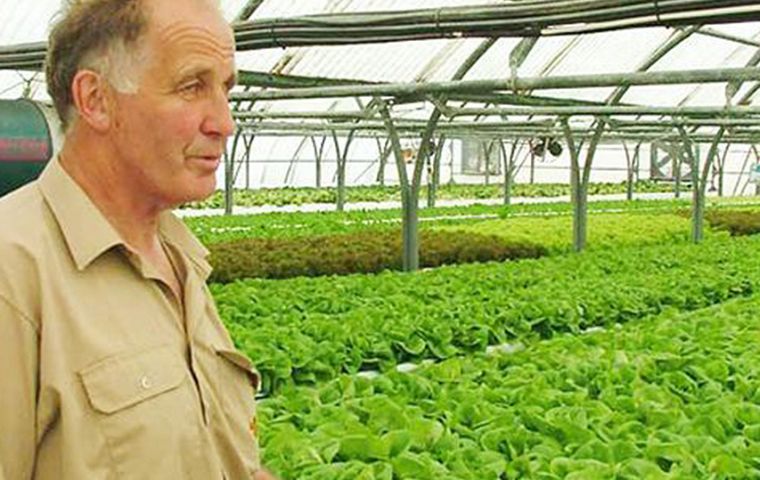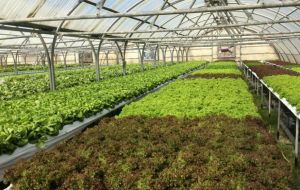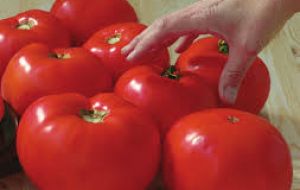MercoPress. South Atlantic News Agency
Falklands' most productive half acre and vegans' organic dream
 Stanley Growers' Tim Miller explained a number of people who had come to the Garden Centre had shown an interest in the source of their fresh produce
Stanley Growers' Tim Miller explained a number of people who had come to the Garden Centre had shown an interest in the source of their fresh produce  Stanley Growers since 1998 has used natural predator pest control, and the same year they started using all waste oils for greenhouse heating
Stanley Growers since 1998 has used natural predator pest control, and the same year they started using all waste oils for greenhouse heating  In a season Stanley Growers produce about 20 tons of tomatoes, 8 tons of cucumbers, 8 tons of peppers, 75,000 head of lettuce and potatoes
In a season Stanley Growers produce about 20 tons of tomatoes, 8 tons of cucumbers, 8 tons of peppers, 75,000 head of lettuce and potatoes Tucked way under the hill and half hidden by 10,000 young trees it’s easy to forget how vast the area is covered by Stanley Growers Ltd. in the Falkland Islands, to the east of the capital Stanley.
Taking advantage on an Open Day visitors dropped by and were expertly guided around the two heated hydroponic greenhouses, a number of the 44 poly-tunnels and shown the 15 acres of field potatoes.
What once was a simple half acre heated green house with three staff producing 10 salad varieties now boasts 18 employees producing over 50 varieties of salads, herbs, vegetable and fruits at different times of the year.
Speaking to Penguin News, owner Tim Miller explained that the idea for the open day had simply been that they hadn’t had one for many years. He said a number of people who had come to the Garden Centre had shown an interest in the source of their fresh produce.
He said: “Also people are becoming more environmentally conscious about their food and how is it produced.” He thought some newcomers, “might not be aware that all that we grow in the greenhouses is pesticide free. And that certainly seemed to be a big topic of interest in all of the groups.”
Mr Miller explained: “Several were also interested in how we get rid of people’s nasty old hydrocarbon waste – engine oil – and totally dispose of it in an environmentally friendly way and in the process turn it back into energy and heat the greenhouses out of it.”
Stanley Growers since 1998 has used natural predator pest control, and the same year they started using all waste oils for greenhouse heating. They have not bought conventional heating fuel since 2000. Waste oils and dirty diesel and kerosene is sourced from fishing, BAS and cruise vessels. They are also Premier Oil’s approved onshore disposer of waste oils and their whole storage and burning system meets UK North Sea Standards.
They are also the Islands' principal importer and supplier of vegetables herbs and fruits year round and imported salads in winter. They airfreight in an average of 1 ton per week of fresh produce from Santiago. A further 20-30 tons a month is imported by refrigerated containers from Montevideo and Covent Garden Market in London.
Stanley Growers markets are Stanley retailers and caterers, lodges in the camp, local vessels, BAS and other scientific vessels, fishing and expedition cruise vessels.
The various fruits in the fruit cages attracted many positive comments (delicious looking raspberries, blackberries, blueberries, tayberries and loganberries to name a few). Mr. Miller said: “And if you were wondering what the pots of calendulas were doing in the fruit cages they are to attract hover flies – the hover fly is the only insect pollinator the Falklands has got.”
Outlining some statistics, he said in a season they produce about 20 tons of tomatoes, 8 tons of cucumbers, 8 tons of peppers, 75,000 head of lettuce, about 1 ton of Christmas potatoes (Ted Jones at San Carlos grows one third of those).
He said some of the costs surprise people: “Our electric bill is about £32,000 and water costs us £16,000 a year.” They would like to have wind turbines or solar panels but these are not compatible with the current power station: “We would have to go independent off the grid as the power station can’t handle anything much in the way of variation in terms of power coming up the line ... but this may be possible with the new power station.”
A 30-year supply agreement to the British Forces ended last September but Mr. Miller assured they were “getting more and more confident now that we can get by without them. It has been a difficult season cash-wise and I have had to dip very deeply into my pension fund to provide the cash to keep the place going this season.”
In order to cover the shortfall he put £45,000 of his own money in to the company and has scrapped his salary for 12 months, “...at 68 I was able to do it as I get the state OAP.”
In fact, if anyone spotted the unusual sight of cantaloupe melons growing in the main hydroponic greenhouse, these lovely treats are one of the crops in the place of those being grown for the MoD. Some of the new crops they tried have worked, “others haven’t as we thought they might not,” and along with “some other new ideas,” they feel they can
move forward.
“There’s a growing tourism demand with ships in the summer and that’s probably only going to increase.”
Mr. Miller said one of the comments that most touched him at the open day came from a friend, a Zimbabwean de-miner, who said: “A hundred Tim Millers in Zimbabwe with our climate we’d be feeding the world…”
Originally set up and owned by FIDC Stanley Growers started production in late 1987 and Tim joined as trainee manager in April 1988. He became manager in 1990 and with Jan bought the business from FIDC by 1995 and finally purchased the assets in 2010. The land is owned by the Falkland Islands Government but on secure long term lease to Stanley Growers. (Penguin News).-




Top Comments
Disclaimer & comment rules-

-

-

Read all commentsHey sourpuss, ever seen yourself in the mirror ?
Mar 02nd, 2019 - 08:42 pm +2I think some journalistic camera licence- those hook like beef tomatoes- that variety is not grown commercially in the Islands
Mar 02nd, 2019 - 09:52 pm 0Looks good. Impressive building the business up like that. :)
Mar 04th, 2019 - 01:33 pm 0@PE
Sorry to inform you that almost everything you eat is genetically altered. Wheat, maize, vegetables, fruit, cows, pigs... all created by humans. Wild tomatoes are the size of a pea, carrots weren't orange until recently, grass seeds are nothing worth eating, aurochs wouldn't stand around to be milked and you wouldn't get much if they did. At least now that you're living in the EU your beef isn't full of hormones, but there is nothing natural about your diet.
Commenting for this story is now closed.
If you have a Facebook account, become a fan and comment on our Facebook Page!